World schooling can cost as little, or as much, as you want it to cost. As a very rough ballpark figure, $100 per day is achievable for a family of 4. Costs depend on where in the world you happen to be world schooling that day, or month, how and what you choose to eat and drink, what standard of accommodation you require, along with what mode of transport you take and how many admission fees you pay for.
There are no fixed overheads in the educational part of world schooling, we’ll look at some figures for various parts of the world.
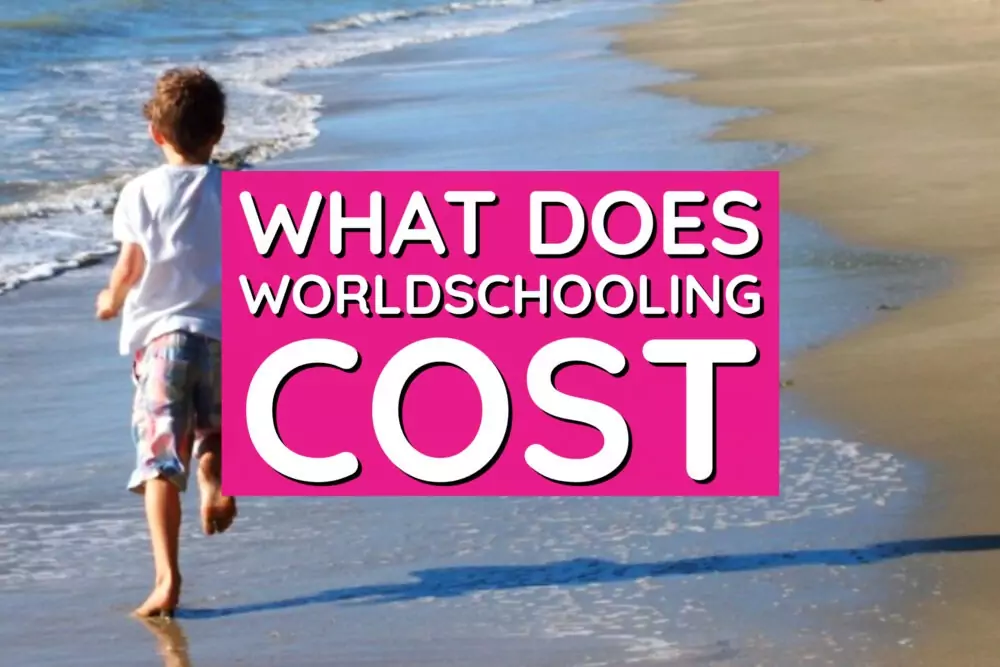
World Schooling Costs
Generally, world schooling is cheaper than staying home if you live in an expensive country and will be world schooling in the cheaper parts of the world.
Worldschooling families sell their homes or stop paying rent and utilities in their home countries.
They get rid of cars, possessions, commutes, and loans. Their only expenses are where they happen to be travelling at that time.
What is world schooling? World schooling is a type of home schooling while travelling (or unschooling) in which a large part of a child’s learning comes from the world, their environment.
Worldschooling children need to experience many diverse environments as part of this process.
Costs of World Schooling
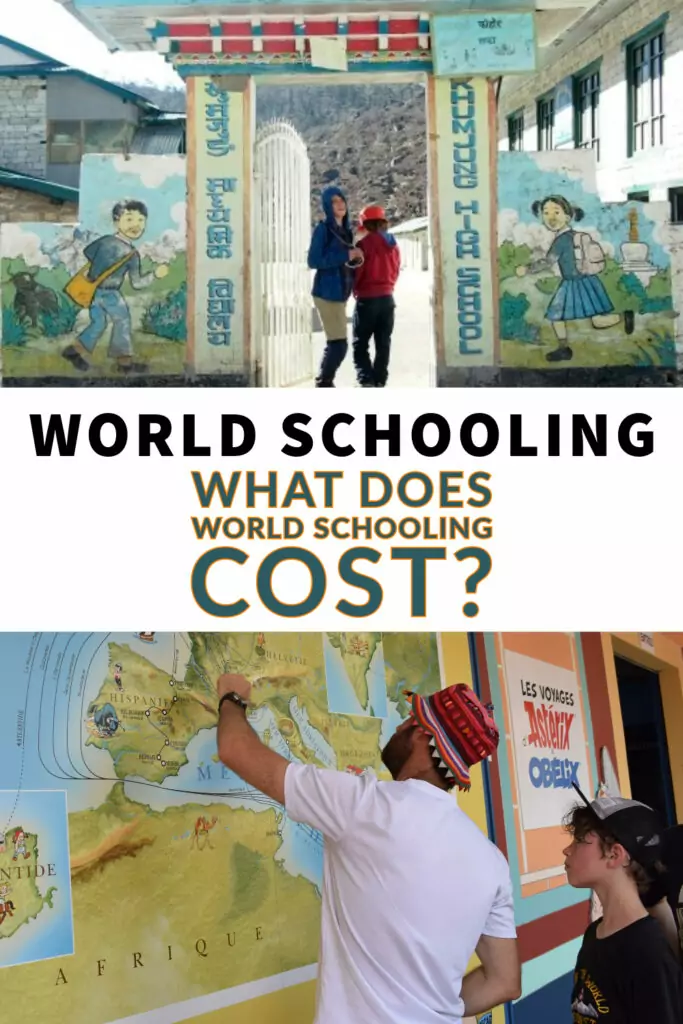
Before world schooling, familiarise yourself with the costs and expenses, both before departure costs, and on-the-road costs.
- insurance
- vaccinations
- visas, visa runs, visa agents, and visa extensions
- luggage
- flights
- buses
- trains
- ferries and cruise ships
- car rides, taxi, Uber, private transfer, driver, etc.
- nightly accommodation in hotels, guest houses, hostels or rented appartments
- food and drink
- laptops
- electrical repairs and replacements
- internet connections and SIM cards
- any online classes, tutors, or learning programs (free resources do exist)
- admission to historical sites, museums, etc.
- clothing
- toiletries and medication
- specialist equipment, eg, trekking gear, snorkelling gear, scuba gear.
- Classes and courses at your destinations such as cooking classes, tours, craft classes, learning to scuba dive.
- Guides and/or porters for trekking or hiking
- international schools, physical or virtual, plus exam entrance fees for iGCSEs
- passports and renewing passports from overseas
There are probably more costs, but the above is a fairly comprehensive list based on our personal experience.
The most expensive part of world schooling for us was undoubtedly nightly accommodation. At the end of the process the cost of sitting exams was huge, but that’s an optional extra.
We kept flights to a minimum as we were mindful of the environment and our budget, but paying for hotels and guest houses did add up.
Generally, we tried to pay about $50 / night for our accommodation for 4 people. In some countries (Laos) we paid as little as $12 per night.
In Singapore at Christmas, we paid $600 per night.
Food costs vary enormously too. In Vietnam and sometimes Thailand you can eat something delicious for $1 each. In Kathmandu we’ve seen the same.
I’m sure you know how expensive eating out is in Western Europe, Australia, and the US.
In the more expensive parts of the world you’ll likely need to self-cater and buy your food at local markets and supermarkets.
In Southeast Asia food is mostly cheap and available everywhere. It’s also some of the best food in the world.
Southeast Asia with kids is a hugely popular choice for worldschooling families and worldschooling communities.
Accommodation costs come down if you stay in one place for multiple months and rent a flat or apartment.
However, in doing that you’ll likely have to pay for your own utilities, internet, laundry, cleaner, toilet tissue, cleaning products, etc. Consider those factors carefully.
Typical World Schooling Costs
As we found when we started looking into typical gap year costs, prices and expenditure varies tremendously.
Our most expensive gap year on our list was $38,000 per person, our cheapest was $8,000 per person.
A lot depends on how many people are travelling, with single travellers paying a lot more than families and couples.
If you’re travelling with kids the per-person cost does come down slightly.
Over the age of about 12 years, you’re paying for extra adults, basically, but there are still savings in that families will share rooms and other accommodations.
The age of your children and how much they cost to travel with and worldschool, is just one factor in considering the best age to travel with kids.
Travel with teenagers, and worldschooling teenagers, we found to be particularly rewarding and of benefit to them. (My elder son has passed his iGCSEs and is studying for A levels at the time of writing this post, worldschooling was great for him)
The Cheapest Destinations For World Schooling
Through our experience, the cheapest countries for world schooling are Vietnam, Thailand, and Laos. Most parts of Southeast Asia and South Asia are quite affordable, with Malaysia and Singapore being more expensive.
Within these countries, the cheaper parts will be away from the big tourist destinations, beaches, and resorts.
Sri Lanka, India, and Nepal are also good cheap places for worldschooling but if you’re planning treks, guides and porters add significantly to costs. Admissions to historic sites in Sri Lanka are also more costly.
Egypt was cheap, but the flights to get there were difficult and expensive for us. So don’t just consider the cost of living in the country, consider the cost of getting there too.
Our most expensive worldschooling destination was, of course, Bhutan. Here the daily tourist fee was hugely expensive and so were the flights to get there.
Big cities like London, Paris and New York also tend to be expensive for worldschoolers.
Our World Schooling History
We worldschooled our two children for at least 7 full years, visiting around 50 countries in the process, on 5 continents. Antarctica didn’t feature, but one day we will!
For most of the time, we travelled at a normal pace for gap year travellers, backpackers, or anybody, family or not, taking part in extended travel.
From time to time we had periods of slow travel, where we stayed long term (months) in places we enjoyed. These included London, Wales, Thailand (Chiang Mai and Bangkok), Vietnam (Hoi An), and in Europe, Romania.
We also own a home in Australia, so I think we can count our limited time in Australia as worldschooling as the kids were certainly learning from this environment, it was new to them.
We go into the costs of worldschooling in all these places.
How Do Families Afford World Schooling?
How families afford worldschooling varies from family to family. We funded our travel and worldschooling at first on savings. Later my husband took jobs, eventually, our websites earned us a very good income and funded our travels fully.
Some families have remote jobs, digital nomad parents aren’t uncommon now. Most are resourceful and think and live differently.
How Much Money Do You Need To World School?
Worldschooling families don’t need to be rich. Worldschooling families need to either have money in the bank in savings or have an income they can earn while they travel.
With working visas being hard to come by, an online income is an ideal way for parents to earn as they travel.
Because of this, you will find that a lot of worldschooling families are digital nomads, people who have found a way to make a living online that is location independent.
The money you need to world school is simply the amount of money you need to travel with your family, full-time, paying for accommodation, food, all travel essentials, clothing, transport, insurance, healthcare, visas, daily expenses, and some educational resources.
These educational resources can include admission costs to places of interest, classes, games, guides, curriculum materials, online learning programs, workbooks, courses, computers and an internet connection.
If worldschooling kids sit exams, for instance, iGCSEs, this can be very expensive.
More Information on World Schooling
We have written about worldschooling further for you to further explore more worldschooling topics. I give you a list of related posts about worldschooling below, because our related posts plugin is misbehaving currently!
- What is Worldschooling?
- Worldschooling teens
- How to travel with teens.
- Worldschooling History
- Greece, an educational tour.
- Worldschooling Destinations (a kind of curriculum)
- Why we eventually quit homeschooling (and by default, worldschooling)
- Taking exams
- Making Money Blogging
- Family Travel
- Homeschool and Travel
- Why Homeschool?
- Do we regret homeschooling our kids?
- What does a homeschool day look like?
- Problems of travel with kids
- Best Age to Travel With Kids
- Family Gap Year Planning
- Gap Year Costs Comparison
So will you do it? Will you give your kids and your family this incredible gift? It worked out wonderfully for us, no regrets at all. Those 7 years were truly life-changing for all of us, as was the decision to homeschool over a decade ago. Worldschooling and extended travel was our best life, and as the world opens up, we hope to live it again. I don’t think it’s too early to be planning now. Head over to our post on planning a family gap year (or longer!)
If you'd like to hire a car during your stay, use this car rental comparison tool to find the best deal!
We also suggest you take a look at this company to get a quote for all kinds of the more tricky adventure or extended travel insurance.
Try Stayz / VRBO for an alternative way to find rentals on homes/apartments/condos in any country!
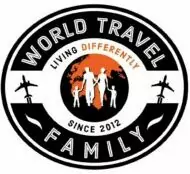

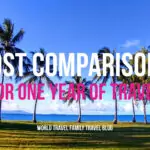



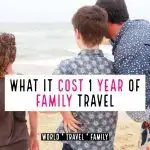

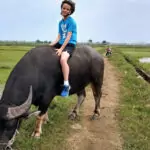
Great Post. Very informative.
Thank you. We love to help!
We are aiming to travel as a family around SEA next year and really want to be able to get on with the planning but until we know when we will be able to set off its really difficult.
We will be funding our year out with savings so aim to be at the lower end of the scale (hence SEA as a destination!), but hopefully that will lead to longer term travel if we can find a way to make that financially sustainable!
We really hope to find a way to make it work so that we can spend these key years with the kids travelling and learning together!
Best of luck Keith. We’re in the same situation, just treading water, wasting our lives, until borders open. By the way Keith have you found all our content on Southeast Asia with kids? It may be useful.
Thanks Alyson. Yes, we have read lots of your articles and will no doubt be revisiting them when we get back to planning our itinerary.
We are trying to take the positives out of the delay, using the time to add to our savings so that we can travel for longer, but I can totally understand your frustration given you have been living that lifestyle for so long.
Fingers crossed for better times in 2022!